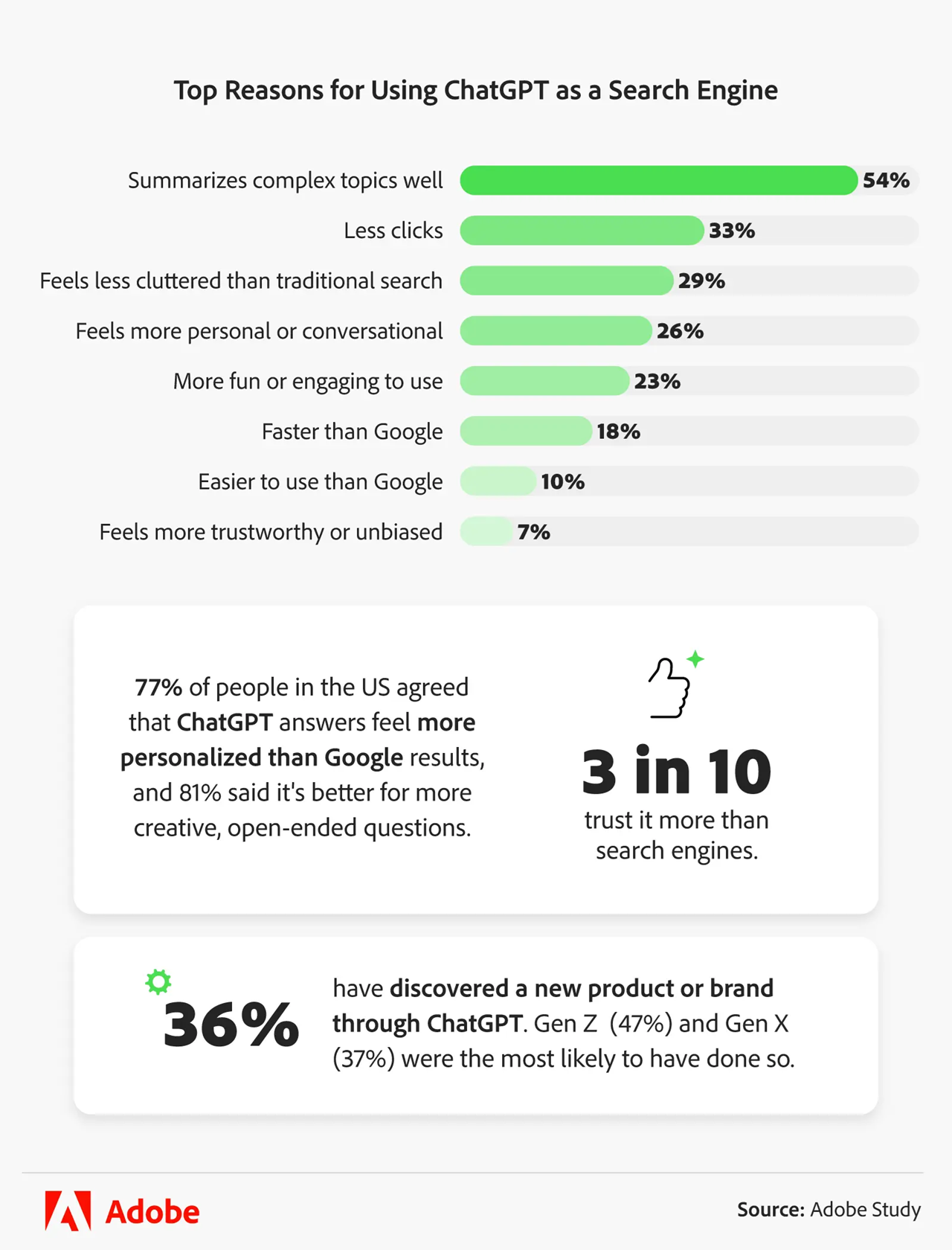Developer Offer
Try ImaginePro API with 50 Free Credits
Build and ship AI-powered visuals with Midjourney, Flux, and more — free credits refresh every month.
ChatGPTs True Calling Is A Smarter Search Engine
 (Image credit: Shutterstock)
(Image credit: Shutterstock)
Key Takeaways
- A new survey shows 77% of ChatGPT users in the US now use it as a search engine.
- Nearly a quarter of users choose ChatGPT over Google as their first choice for search.
- While OpenAI CEO Sam Altman highlights ChatGPT's advanced capabilities, its practical use for information retrieval is what drives its popularity.
OpenAI's CEO, Sam Altman, often expresses awe and even a little fear about the power of the latest ChatGPT models. However, for the average person, the real magic of AI seems to be its effectiveness as a search engine. According to a recent survey by Adobe, it turns out that a staggering 77% of U.S. ChatGPT users are less interested in a synthetic colleague or a digital butler and are more focused on a faster, more conversational version of Google. For nearly a quarter of those surveyed, ChatGPT is now their primary tool for looking things up, a trend that is even more pronounced among younger demographics.
From Grand Visions to Daily Questions
The use cases aren't for complex, multi-step AI projects. Instead, people are turning to ChatGPT for the everyday questions they once would have typed into Google. The survey found that 55% of users use it for general inquiries. Beyond that, 53% look to the AI chatbot for creative brainstorming, one in five seek financial advice, and 13% use it to find products to buy online.
When asked why they prefer ChatGPT, users pointed to its ability to summarize information quickly, provide answers with fewer clicks, and offer a more personal, conversational experience. In a significant shift, around 30% of those surveyed stated that they trust ChatGPT more than traditional search engines.
 (Image credit: Adobe)
(Image credit: Adobe)
A Tale of Utility Over Ambition
This reality contrasts sharply with the vision OpenAI has promoted, especially with the launch of its GPT Store and other advanced features. Altman and his team have consistently described a future where ChatGPT acts as a co-pilot for your life, learning from your habits to anticipate your needs. However, most users are keeping it simple: they ask a question, get an answer, and move on.
This mirrors the evolution of voice assistants like Amazon's Alexa and Google Assistant. Initially marketed as life-altering companions, their most common functions remain setting timers and checking the weather. This isn't necessarily a failure of imagination but rather a triumph of utility. People don't need to dream of artificial general intelligence when all they really need is a quick answer to a simple question.
The Shifting Landscape of Information Retrieval
This growing preference for AI-powered search has not gone unnoticed by Google. The search giant has been aggressively integrating AI into its platform, with features like AI-generated summaries at the top of search results and a Gemini-powered AI Mode. Despite these efforts, the long-standing monopoly Google held on how we find information may be permanently disrupted.
Of course, ChatGPT is not without its flaws. Users are aware of its limitations and often still double-check its answers. The lack of clear citations can be a point of frustration, and for real-time information, a traditional search engine is often faster.
Even as OpenAI showcases futuristic AI agents that can operate apps on your behalf, the reality is that most users just want to know if they overwatered their houseplant. While the company hints at the power of GPT-5, the average person is more likely to ask it for a recommendation for a new suitcase. This quiet, user-driven shift in how we seek information is arguably more profound than any single feature OpenAI has announced.
Compare Plans & Pricing
Find the plan that matches your workload and unlock full access to ImaginePro.
| Plan | Price | Highlights |
|---|---|---|
| Standard | $8 / month |
|
| Premium | $20 / month |
|
Need custom terms? Talk to us to tailor credits, rate limits, or deployment options.
View All Pricing Details

